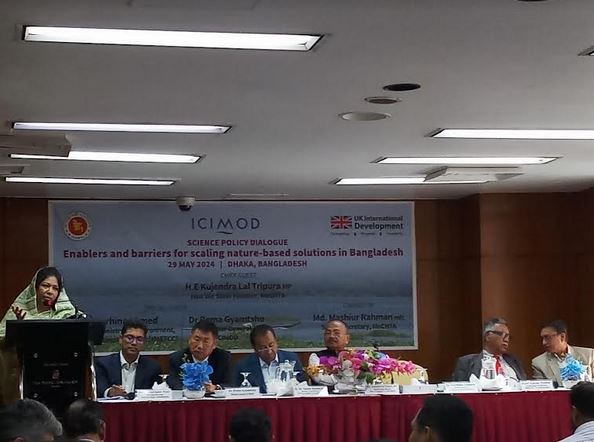
DHAKA, May 29, 2024 (BSS) - Experts at a policy dialogue today stressed the need for scaling up Nature-based Solutions (NbS) in the Chittagong Hill Tracts (CHT) aiming to address the impacts and risk of climate change and environmental degradation.
They said the CHT region in Bangladesh have been facing increased risk of natural disasters, including flood and landslide, induced by climate change, and the NbS can help cope with these environmental hazards.
The Ministry of Chattogram Hill Tract Affairs and the Integrated Centre for Mountain Development (ICIMOD) jointly arranged the 'National Science Policy Dialogue on Enablers and Barriers for Scaling Nature-based Solutions (NbS) in Bangladesh' at Sonargaon Hotel in the capital.
State Minister for Chattogram Hill Tract Affairs Kujendra Lal Tripura spoke at the opening session of the daylong dialogue as the chief guest, with Chattogram Hill Tract Affairs Senior Secretary Md Mashiur Rahman in the chair.
Eminent water expert and Emeritus Professor at BRAC University Dr Ainun Nishat, Environment Forest and Climate Change Secretary Dr Farhina Ahmed and ICIMOD Director General Dr Pema Gyamtsho addressed as special guests.
Additional Secretary of the Chattogram Hill Tract Affairs Ministry Prodip Kumar Mahottam presented an overview on the NbS in Bangladesh.
In his keynote speech, Prof Ainun Nishat said multiple varieties of trees in the country's hilly region can help regenerate environment, forest and biodiversity.
Recalling the days of his service life when he was posted in Rangamati in 1970, he said there were several hundreds of springs there and even those came down during the dry season, as the forest land could absorb the moisture and release it slowly. "And in the monsoon months, there were beautiful waterfalls."
Prof Nishat said local people collect water from the springs but destruction of native species in the CHT put them in scarcity of water.
Noting that ecosystem-based adaptation and nature-based solutions are very important, he said Bangladesh should focus on adaptation as it has excellent policy documents to this end.
He said the local CHT people understand that scarcity of water and food insecurity are their main problems as climate change is changing the total hydrological cycle and the nature of weather.
Dr Nishat said the weather is becoming more unpredictable, warning that "more bad days are coming".
As there would be heavy rainfall in the CHT in the coming days, the Meteorological Department and the Disaster Management Ministry are repeatedly warning the people of the hill tracts that there could be landslides, he said.
Claiming that climate change is a reality now, no longer a science fiction, the water expert stressed forming local level action plans specially focusing on CHT aiming to cope with adverse impacts of climate change.
Kujendra Lal Tripura said the government has completed many development projects in the CHT but these were not sustainable ones.
The water sources are drying up, the patterns of agriculture and land use are being changed in the CHT, while a huge number of tourists are visiting the hills indiscriminately affecting nature, environment and biodiversity there, he said.
Stressing the need for involving local communities in tourism and building nature-friendly home stays, by locals, for tourists aiming to ensure eco-friendly tourism in the CHT, the state minister said the nature-based solutions and geographical information system (GIS) could also be used to this end.
He said the hilly springs could be revived, the landscape of the CHT could be protected and sustainable tourism could be flourished by applying the NbS.